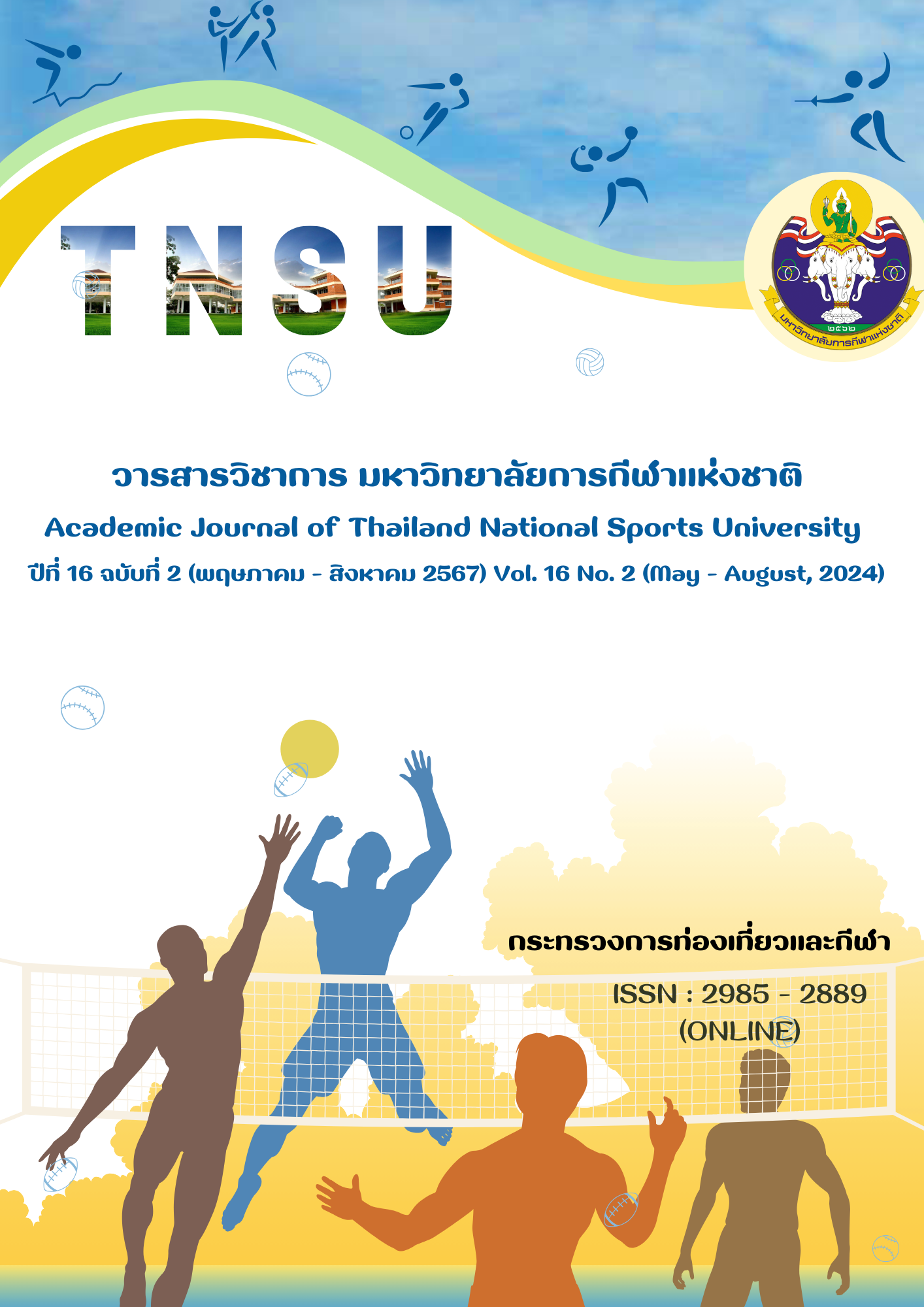รูปแบบการจัดการเรียนรู้เสริมสร้างจิตสำนึกและความสามารถกำกับตนเองของนักเรียน ชั้นประถมศึกษาปีที่ 6 ตามแนวคิดอภิปัญญา การเรียนรู้แบบร่วมมือ ทฤษฎีการรู้คิดทางสังคม
Main Article Content
บทคัดย่อ
การวิจัยครั้งนี้มีวัตถุประสงค์เพื่อ 1) ศึกษาสภาพปัจจุบันและความต้องการด้านการจัดการเรียนรู้ ประกอบการพัฒนารูปแบบการจัดการเรียนรู้เสริมสร้างจิตสำนึกและความสามารถกำกับตนเอง ของนักเรียนชั้นประถมศึกษาปีที่ 6 และ 2) ศึกษาผลการทดลองใช้รูปแบบการจัดการเรียนรู้เสริมสร้างจิตสำนึกและความสามารถกำกับตนเอง โดยดำเนินการศึกษาสภาพปัจจุบันและความต้องการ ประกอบการพัฒนารูปแบบการจัดการเรียนรู้ ในบริบทโรงเรียนสังกัดเทศบาลเมืองนครพนม จำนวน 4 โรงเรียน ด้วยการสัมภาษณ์กลุ่มเป้าหมายครูผู้สอน จำนวน 4 คน นักเรียน 12 คน และสังเกตชั้นเรียน 4 ห้องเรียน โดยใช้วิธีการวิจัยแบบกึ่งทดลองสำหรับทดลองใช้ร่างรูปแบบกับกลุ่มตัวอย่างนักเรียนชั้นประถมศึกษาปีที่ 6 ปีการศึกษา 2565 จำนวน 37 คน ซึ่งได้มาโดยวิธีการสุ่มแบบกลุ่ม (Cluster Random Sampling) เครื่องมือที่ใช้ในการวิจัย ได้แก่ 1) แบบสัมภาษณ์ครูผู้สอน แบบสัมภาษณ์นักเรียน และแบบสังเกตชั้นเรียน 2) แผนการจัดการเรียนรู้ 3) แบบวัดจิตสำนึก และ 4) แบบประเมินความสามารถกำกับตนเอง สถิติที่ใช้ในการวิจัย ได้แก่ ค่าเฉลี่ย ส่วนเบี่ยงเบนมาตรฐาน และ t - test (Dependent Samples)
ผลการวิจัย พบว่า
- ครูผู้สอนกลุ่มเป้าหมายมีความคิดเห็นสอดคล้องกัน ว่าต้องการสนับสนุนให้ผู้เรียนได้รับการพัฒนาจิตสำนึกและความสามารถกำกับตนเอง ตามกรอบเป้าหมายของหลักสูตรและความต้องการของสถานศึกษาเพิ่มขึ้น ขณะที่นักเรียนชั้นประถมศึกษาปีที่ 6 บางคนได้แสดงออกและแสดงความคิดเห็นเพื่อสื่อสารข้อมูลกับเพื่อนในมุมมองที่ต้องการสร้างปฏิสัมพันธ์ที่มีคุณค่าและความรู้สึกด้านบวก พร้อมการใช้เหตุผลสนับสนุนเพิ่มขึ้น ผู้วิจัยจึงพัฒนารูปแบบการจัดการเรียนรู้ เสริมสร้างจิตสำนึกและความสามารถกำกับตนเอง ตามแนวคิดอภิปัญญาการเรียนแบบร่วมมือ และทฤษฎีการเรียนรู้ทางสังคม สำหรับนักเรียนชั้นประถมศึกษาปีที่ 6 ซึ่งรูปแบบการจัดการเรียนรู้ประกอบด้วย 6 องค์ประกอบ และกิจกรรมการเรียนรู้ 5 ขั้น รวมทั้งมีผลการประเมินคุณภาพและความเหมาะสมของรูปแบบ โดยผู้เชี่ยวชาญอยู่ในระดับมาก มีค่าเฉลี่ยเท่ากับ 4.10 (S.D.= 0.25)
- ผลการทดลองใช้รูปแบบการจัดการเรียนรู้พบว่า นักเรียนกลุ่มทดลองจัดการเรียนรู้ตามรูปแบบ มีผลการพัฒนาด้านจิตสำนึกและด้านความสามารถกำกับตนเอง สูงกว่าก่อนเรียน อย่างมีนัยสำคัญทางสถิติที่ระดับ .05
Article Details

อนุญาตภายใต้เงื่อนไข Creative Commons Attribution-NonCommercial-NoDerivatives 4.0 International License.
บทความที่ได้รับการตีพิมพ์เป็นลิขสิทธิ์ของวารสารวิชาการ มหาวิทยาลัยการกีฬาแห่งชาติ ข้อความที่ปรากฏในบทความแต่ละเรื่องในวารสารวิชาการเล่มนี้ เป็นความคิดเห็นส่วนตัวของผู้เขียนแต่ละท่านไม่เกี่ยวข้องกับวารสารวิชาการมหาวิทยาลัยการกีฬาแห่งชาติ แต่อย่างใด ความรับผิดชอบองค์ประกอบทั้งหมดของบทความแต่ละเรื่องเป็นของผู้เขียนแต่ละท่าน หากมีความผิดพลาดใดๆ ผู้เขียนแต่ละท่านจะรับผิดชอบบทความของตนเองแต่ผู้เดียว
เอกสารอ้างอิง
Bandura, A. (1997). Self - efficacy: The exercise of control. New York: W.H. Freeman and Company.
Coon, D., & John, O. M. (2011). Introduction to psychology: Gateways to mind and behavior with concept maps and reviews. Cengage Learning.
Erikson, E. H. (1959). Identity and the life cycle: Selected papers. Psychological, 1, 1 – 171.
Hartman, H. J. (2001). Metacognition in learning and instruction: Theory, research and practice. Dordrecht, Netherlands: Kluwer Academic Publishers.
Ivey, A. E., D’ Andrea, J. M., & Ivey, M. B. (2012). Theories of counseling and psychotherapy: A multicultural perspective. CA: Sage Publication. Psychology.
Järvenoja, H., Malmberg, J., Törmänen, T., Mänty, K., Haataja, E., Ahola, S., & Järvelä, S. (2020) A collaborative learning design for promoting and analyzing adaptive motivation and emotion regulation in the science classroom. Front. Educ, 5, 111. doi: 10.3389/feduc.2020.00111.
Johnson, R. T. & Johnson, E. J. (1994). The new circles of learning: Cooperation in the classroom and school. S.l.: s.n.
Joyce, B., Marsha, W., & Emily, C. (2011). Models of teaching. Boston MA: Pearson Education, Inc.
Kohlberg (1981). The philosophy of moral development. New York: Harper and Row.
Moilanen, K. L. (2007). The adolescent self-regulatory inventory: the development and validation of a questionnaire of short-term and long-term self - regulation. J Youth Adolescence, 36, 835 - 848.
Nattanan Chuicomwong, & Ubonwan Songserm. (2023). Development of the instructional model using metacognition approach to mathematical problem-solving ability and self - regulation for upper primary school students. Silpakorn Educational Research Journal, 15(1), 168 - 189.
Nirat Jantharajit, Sarit Srikhao, Phichittra Thongpanit, & Supawadee Kanjanakate. (2023). Development of social skill and self - regulation abilities for 6th grade students based on bandura theory, metacognition, reasoning approach and collaborative learning. Journal of Education Rajabhat Maha Sarakham University, 20(2), 189 - 201.
Nitko, A. J. & Brookhart, S.M. (2011). Educational assessment of students (6th ed.). Boston: MA. Pearson Education.
Office of Academy and Educational Standards. (2017). The guideline of learning management based on core curriculum for basic education, 2551 BE. Bangkok: The Agricultural Co - operative Federation of Thailand Press.
Piaget, J. (1997). The construction of reality in the child. N.Y.: Ballantine Books.
Richard, S., David, A. (1990). Effect of a general practitioner's consulting style on patients' satisfaction: a controlled study. British Medical Journal, 301(6758), 968 - 970.
Slavin, R. E. (1990). Cooperative learning, theory research, and practice. Engle wood Cliffs, New jersey: Prentice - Hall.


